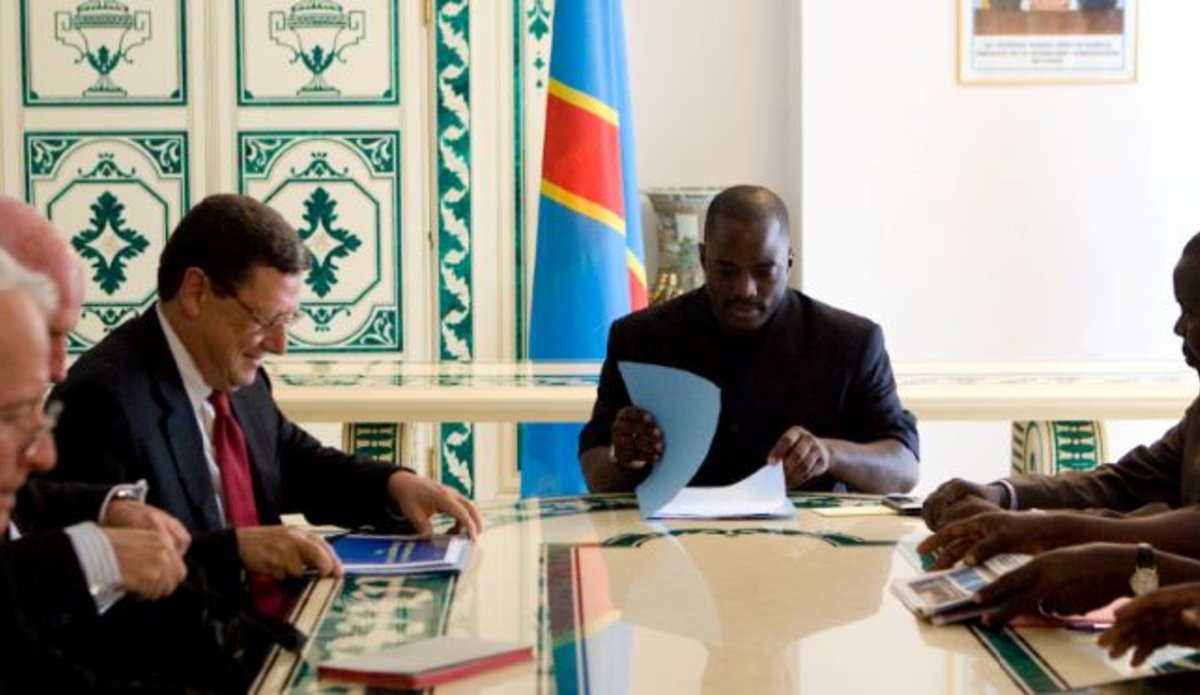The Political Affairs Division (PAD) acts as a think tank for the Mission. It gathers and analyses information, and provides the Special Representative of the Secretary General (SRSG) and other senior managers with appropriate policy and strategic advice related to MONUC’s mandate. PAD also prepares situation reports and supports outreach and advocacy for peace, stabilization and reconstruction in the DRC as it emerges from conflict.
PAD supports democratization and institutional reform; helps prevent and resolve conflict; and helps build good relations in the Great Lakes.
Democratization and institutional reform
PAD works closely with national and international partners to support democratization in the DRC and assist national and provincial institutions, as well as civil society organizations, to create conducive conditions for the promotion of democracy and the rule of law. This includes technical advice and support for lawmaking and good governance.
Preventing and resolving conflicts
PAD contributes substantially to MONUC’s strategy on conflict prevention and resolution in the DRC. Focusing primarily on developments in the east, it works in tandem with the different sections of MONUC and other national or international partners in implementing the Mission’s mandate of protection of civilians through multi-disciplinary Joint Protection Teams (JPT). The Division contributes to Mission efforts for the restoration of peace in eastern RDC, through support to the peace process and by addressing the presence of Congolese and foreign armed groups.
Building good relations in the Great Lakes
PAD contributes to improved bilateral relations between the DRC and its Great Lakes neighbours through advocacy, facilitation and good offices. This has helped to rebuild confidence between DRC, Rwanda and Uganda and has facilitated the coordination of joint military operations against foreign armed groups. PAD is also focused on the political implications of refugee movements and matters relating to IDPs and DDRRR.
Shared responsibilities
The Political Affairs Division shares its responsibilities between a Reform and Democratization Unit, a Local Conflict Management Unit, and a Regional Relations Cell.
The Reform and Democratization Unit (RDU) monitors and analyses the activities of national institutions, including the Presidency, Government, Parliament, and Judiciary; political parties and coalitions, as well as non-governmental actors. This work is focused on the shared goals of peace and security, particularly in Eastern DRC. RDU also provides support to the country’s main legislative and institutional reforms, in order to strengthen democratization as well as political and economic governance.
The Local Conflict Management Unit (LCMU) analyses conflicts and threats to peace, offering inputs for their prevention and resolution. Its monitoring and analysis aims to provide early warnings. LCMU also elaborates strategic concepts; makes recommendations for crisis management; and supports mediation and community reconciliation. Recent initiatives by State and International actors for stabilization and conflict resolution include the AMANI Program, the integration of armed groups into national institutions, the Nairobi Communiqué and the DRC’s Stabilization and Reconstruction Plan (STAREC).
The Regional Relations Cell (RRC) works closely with MONUC liaison offices in Kampala, Kigali and Pretoria. It analyses regional relations in the Great Lakes and monitors their impact on the consolidation of peace in the DRC. Main activities of the RRC include advocacy for regional cooperation and the improvement of diplomatic relations. The Cell liaises with the team of the Special Envoy of the Secretary-General, Olusegun Obasanjo, and covers developments on the DRC-Rwanda Bilateral Commission. It also follows up on developments on the ICGLR (Stability Pact), the African Union (AU) and the involvement of sub-regional organizations in the DRC.
 UN
UN United Nations Peacekeeping
United Nations Peacekeeping
